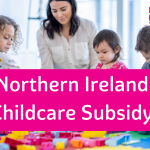24% of Local Children Live in Poverty – It’s time to invest in childcare
3.5 million children live in poverty
New statistics released by the End Child Poverty Coalition show that the rate of child poverty across the UK has increased. The figures show that more than 3.5 million children live in poverty.
In Northern Ireland the rate of children in poverty now sits at 24%, rising to 1 in 3 in some areas, such as West Belfast and Foyle.
These figures present a worrying trend, more children than ever are experiencing poverty, so much so that for many growing up in poverty is normalised and will be carried on from generation to generation. This is detrimental for children’s life chances and can impact on their rate of development. Speaking on Good Morning Ulster, Peter Bryson from End Child Poverty, commented that children growing up in poverty can be as much as a year behind in their development by the time they reach school age.
Childcare and child poverty
The lack of affordable childcare is a contributory factor to the rate of child poverty. Childcare impacts on the rate of child poverty in three ways:
1) The lack of available childcare is a barrier to employment for parents:
Each year Employers For Childcare surveys local parents about the impact childcare costs have on their family. In the 2015 survey 46% of parents commented that they reduced their working hours or left work altogether because of the cost of childcare.
2) The high cost of childcare places pressure on family incomes:
In the same survey 56% of parents said that they were under increased financial pressure because of their childcare bill. Worryingly 24% of parents used other means such as overdrafts, credit cards or loans in order to pay their childcare bill. 5% of these parents relied on payday loans.
3) Childcare is essential for early intervention, particularly regarding the developmental needs of children:
The most crucial years for learning and development are from birth to the age of six. The benefits of providing good quality childcare during these years are substantial and include improvements in cognitive skills, such as language development, logic, reasoning and concentration.
Policy Exchange research in 2013 showed that only 56% of children living in the poorest 30% of areas achieved a good level of development, compared to 68% of children living outside these areas. Children in disadvantaged areas can be left with long-term educational disadvantage if they cannot access good quality childcare.
Addressing child poverty
The End Child Poverty Coalition are calling on the Chancellor to offer more support to families in his upcoming Autumn Statement. In particular, the group are asking for an end to the freeze on children’s benefits, and to reverse the sharp cuts being introduced to in-work benefits under Universal Credit.
Action must also be taken to address the childcare infrastructure, particularly in Northern Ireland. Locally, our politicians and policy makers are working on developing a Programme for Government, we are hopeful that the figures released today will encourage officials to take meaningful steps over the next Programme for Government period to address child poverty in Northern Ireland.
For more information on your entitlements please get in touch or contact our Family Benefits Advice Service for a free personal benefits check, call 028 9267 8200.






